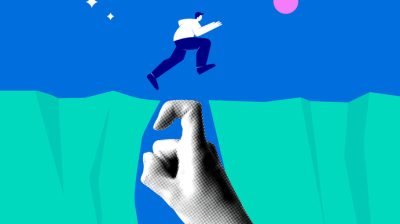Different types of therapy
Learn more about the different types of therapy.

Therapy is a way to improve your mental health by talking through your thoughts, feelings, and behaviours with a fully trained, accredited psychotherapist. In this factsheet, you will learn about five common types of therapy, including the main assumptions behind each and what you can expect if you choose to try them. Each therapy offers a different approach to understanding and improving your mental well-being, and the best choice for you will depend on your personal needs, preferences, and the issues you want to work on. Therapists often offer different types of therapy based on their training and experience, so finding the right fit may take some collaboration between you and your therapist.
Read more on how to access counselling and psychotherapy in Ireland.
Common types of therapy
An accredited psychotherapist is a therapist who has met specific professional standards set by an accrediting organisation like the Irish Association for Counselling and Psychotherapy (IACP) or the Irish Council for Psychotherapy. This means the psychotherapist has completed the necessary training, gained relevant experience, and is qualified to provide different types of therapy according to certain agreed upon standards. Being accredited also means the psychotherapist adheres to ethical practices and continues their professional development.
In the next sections, you will learn more about five types of therapy offered by accredited psychotherapists. These include:
- Psychodynamic therapies
- Cognitive behavioural therapy (CBT)
- Acceptance and commitment therapy (ACT)
- Humanistic & integrative therapy
- Couple and family therapy
Psychodynamic therapies
Developed by Sigmund Freud in the early 20th century, psychoanalysis is a type of therapy that explores how unconscious thoughts and past experiences influence our behaviour in the present. An unconscious thought is something that influences how you act or feel without you being fully aware of it. For example, if you have a hidden fear of failure, it might make you feel nervous about trying new things, even if you don’t consciously know why.
Today, some psychotherapists offer psychodynamic therapy, a version of Freud’s original psychoanalysis that has been adapted for our modern society. Psychodynamic therapies continue to examine unconscious processes, while also considering other important factors, like:
- How an individual relates to other people
- The effects of the external world and culture on the shaping of that individual’s personality
Main assumptions
These therapies assume that early childhood experiences and inner emotional struggles shape our emotions and behaviour. The goal is to bring these unconscious factors to light, helping you understand and resolve deep-seated issues. In therapy, you might:
- Reflect on how you typically behave in your close relationships
- Examine the meaning of dreams
- Explore what comes to the surface when you allow your thoughts to flow naturally without censoring them, an exercise known as “free association”
What to expect
When trying psychodynamic therapy, expect to explore past experiences and uncover how they impact your present life. Sessions are usually talk-based, and you may discuss recurring themes in your relationships, behaviour and thinking.
Cognitive Behavioural Therapy (CBT)
Cognitive Behavioural Therapy (CBT) emerged from the combination of cognitive therapy, developed by Aaron Beck in the 1960s, and behaviour therapy, which focuses on changing specific behaviours. CBT integrates these two types of therapy, aiming to reduce a person’s difficult feelings and unhelpful behaviours by teaching them how to change their thought patterns.
A thought pattern is a habitual way of thinking that shapes how you perceive and react to situations. Read more about common thought patterns and how to change them.
Main assumptions
CBT is based on the idea that our thoughts, behaviours, and emotions are interconnected. It assumes that negative thoughts and unhelpful behaviours can contribute to emotional distress. The goal is to identify and challenge distorted thinking patterns. Distorted thinking patterns are unhelpful or biased ways of thinking that can make situations seem worse or more threatening than they really are. By learning to think in a more balanced way, people may be less likely to resort to problematic behaviours, leading to reductions in a person’s feelings of low mood and anxiety.
CBT-based techniques can include:
- Exposure therapy, a treatment that can help people overcome phobias, obsessive-compulsive behaviours or anxiety by gradually and safely being exposed to the source of the fear or distress
- Role-playing difficult social interactions and scenarios
- Developing new problem-solving skills
- Behavioural activation, which involves purposely taking part in certain activities, even if you don’t feel the desire or motivation to engage in them. The idea is that a person’s mood can improve through deliberately engaging in these activities over time.
What to expect
In CBT, you’ll work on recognising and changing negative thought patterns, as well as learning practical skills to manage difficult situations or social interactions. Sessions are often structured and goal-oriented, focusing on both thought and behaviour changes to improve your overall well-being. Many CBT therapists will expect individuals to complete exercises outside of the therapy sessions, and to practise new strategies in their daily lives.
Acceptance and Commitment Therapy
Psychologist Steven C. Hayes developed Acceptance and Commitment Therapy (ACT) in the 1980s as a type of cognitive-behavioural therapy. ACT incorporates mindfulness practices along with commitment to values-based living. Values-based living means making choices and taking actions that align with what is most important to you, such as your beliefs, principles, or goals in life. ACT’s aim is not to reduce your symptoms directly but to help you live a fuller life by increasing your psychological flexibility. Psychological flexibility involves being able to adapt your thoughts and actions in response to different situations, staying open to change, and focusing on what matters most to you, even when facing challenges or discomfort.
Main assumptions
ACT assumes that psychological suffering arises from “experiential avoidance” (attempting to avoid or escape negative emotions, thoughts, or experiences), amongst other things. ACT promotes the idea that it is not the presence of negative thoughts or emotions that causes distress, but the struggle against them. The therapy encourages acceptance of difficult internal experiences, mindfulness to stay present, and commitment to taking actions based on personal values rather than avoiding discomfort.
What to expect
In ACT, you will work with a psychotherapist to develop mindfulness skills that help you stay present with challenging thoughts and feelings without judgement. The therapy involves six core processes:
- Acceptance
- Distancing from thoughts
- Being present
- Viewing yourself as separate from your experiences (“self-as-context”)
- Clarifying your own beliefs and values (“values clarification”)
- Committed action
Through these processes, clients learn to accept difficult emotions and commit to taking meaningful actions aligned with their values, even in the face of discomfort.
Humanistic & integrative therapy
In searching for a therapist on the ICP or IACP registers, you may notice that some psychotherapists identify as practitioners of humanistic and integrative therapy. Humanistic and integrative psychotherapists combine different types of humanistic therapies to meet your individual needs in a flexible, inclusive way. This approach recognises that no single therapy fits all. Humanistic and integrative psychotherapists may use different humanistic therapies at different stages of the process or may use the same blended approach throughout the therapy.
Humanistic therapies emerged in the 1950s, and they emphasise personal growth. The American psychotherapists Carl Rogers, Viktor Frankl, Perl Fritz, and Abraham Maslow are usually credited with developing this field. Humanists believe that all people are good at their core and will naturally move towards self-actualisation once their basic needs (e.g., food, water, shelter, safety, love and belonging) have been met. Self-actualisation is the process of fulfilling your maximum potential or becoming the best version of yourself.
Humanistic and integrative approach to therapy relies on building a strong therapeutic alliance. This is common to most modern types of therapy. The therapeutic alliance is the trusting, collaborative relationship that often develops between a therapist and a client. Within the therapeutic alliance, both therapist and client work together toward the client’s goals in therapy. This strong connection is crucial for effective therapy. It creates a safe space for the client to explore their own experience and begin to discover their true self.
Three common types of humanistic therapy which humanistic and integrative psychotherapists might use include:
Person-centred therapy
Person-centred therapists aim to create a supportive environment by showing empathy, unconditional positive regard, and genuineness. When a therapist shows unconditional positive regard, they accept and support their client without expecting them to prove their worth through achievements or by behaving in certain desired ways. This means the therapist values the person just because they are a human being who deserves respect and dignity, no matter their past actions or beliefs. However, showing unconditional positive regard does not mean ignoring harmful behaviours; it means treating the person with respect while still addressing any negative actions in a respectful way.
Gestalt therapy
Gestalt therapists focus on the present moment. They use techniques like role-playing and guided imagery to help you become more aware of your whole self. This type of therapy can help you change your perspective on reality. This, in turn, can help you face challenges with a different mind-set.
Existential therapy
This therapy explores meaning and choice in life. It helps you face some of life’s more difficult realities, such as death, freedom, and isolation in order to find a sense of personal meaning.
Viktor Frankl, a Holocaust survivor from World War II, created logotherapy, a type of existential therapy. It focuses on the idea that the main motivation in life is to find meaning. Frankl believed that, even in the toughest situations, people can discover a sense of purpose. Having a sense of purpose can improve a person’s mental health. Unlike other therapies that focus on the past, logotherapy encourages people to make choices and take responsibility for their future.
Main assumptions of humanistic & integrative psychotherapy
Humanistic therapies assume that people will naturally self-improve and grow in positive ways when they are in the right supportive environments. One of the main goals of the humanistic therapist is to create these conditions. Creation of these supportive conditions can help you connect with your true self and reach your maximum potential.
What to expect from of humanistic & integrative psychotherapy
Sessions are typically conversational and focused on self-exploration. Compared to other therapies like CBT, humanistic and integrative psychotherapists do not generally assign written exercises. Expect to direct the conversation where you need it to go. This might include understanding your feelings and motivations, gaining insight into your personal experiences, and getting to know your true self.
Couple and Family Therapy
Couple and family therapy is a type of therapy designed to address issues within relationships and family dynamics. The therapy focuses on improving communication, resolving conflicts, and strengthening connections among family members or partners.
The therapist works with the couple or family to understand and address different patterns of beliefs and behaviours. These differences often affect interactions between members of a group. The goal is to improve everyone’s understanding of what is causing the conflict and their individual role in it. This type of therapy can also help people develop healthier ways of relating to each other.
Main assumptions
Compared to individual forms of therapy, family therapy tends to put a greater emphasis on the interconnectedness of people and their problems. It is generally understood that a person’s emotional and psychological distress does not arise in a vacuum. This distress is often rooted in the social environment in which a person finds themselves. Couple and family therapy recognises that conflict is a natural, inevitable part of living within families or partnerships. It also acknowledges that a person’s early life and family dynamics can play a role in escalating the conflict. The ways in which people view these interpersonal differences, make sense of them, and respond lies at the heart of couple and family therapy.
What to expect
Couple and family therapy typically involves all members of a couple or family who are affected by a conflict or set of problems. This can include extended family members. Deciding who should attend the sessions can form an important part of the process. Unlike individual therapy, couple and family therapy usually takes place over fewer sessions.
Early family dynamics and life experiences can influence a person’s ability to trust or handle conflict. If you are considering this type of therapy, be prepared to explore issues such as trust, choice, conflict resolution, and autonomy (freedom) together. The therapist will often work with an entire group. This can help with identifying the roots of conflict and developing new ways to understand and address these issues.
If any one of these therapies sounds like it might be the right fit for you, find out how to access counselling or therapy in Ireland.






